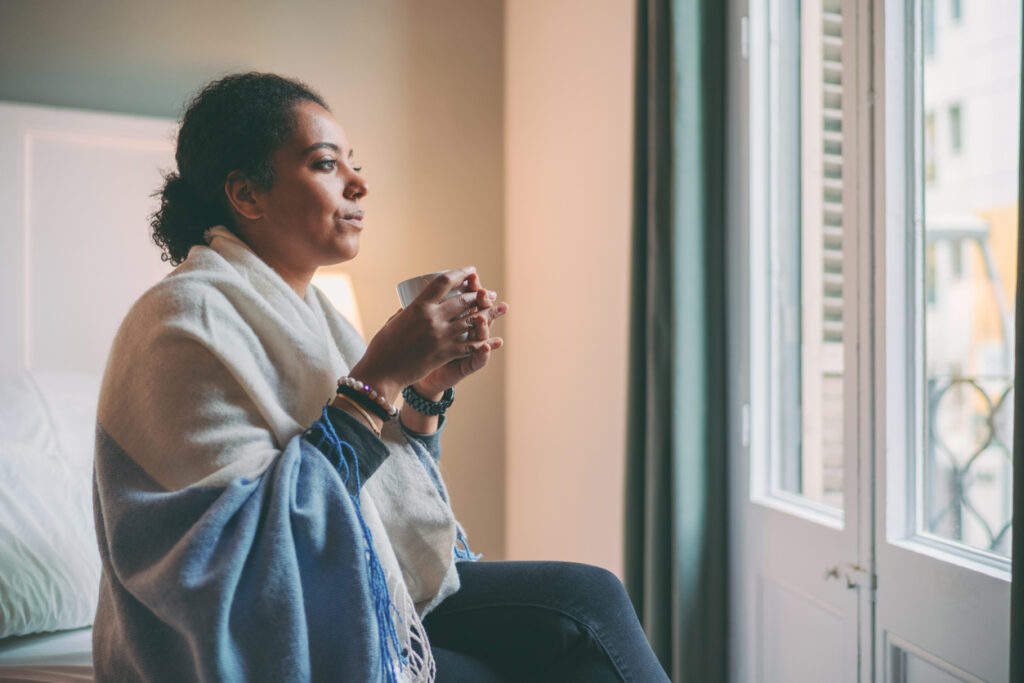Struggling with fertility issues can often have a major impact on a person’s emotions and moods. The stress of fertility treatment, sadness at not being able to conceive, and yearning for the family you want can lead you to feel down. This may even lead to more serious mental health issues like anxiety and depression. Plus, the hormonal medications used in fertility treatment can cause mood swings and heighten feelings of anxiety and sadness. Add the shorter days and long, dark nights of winter to the mix, and many people feel even more stressed and depressed.

About 14 percent of people living in the U.S. experience the winter blues, while about 6 percent have a more severe form known as seasonal affective disorder (SAD). The emotions of the winter blues and SAD can be exacerbated by fertility treatment. Here are some hints to recognize the winter blues and SAD, as well as tips to help manage emotional turmoil during your fertility journey.
The Winter Blues
Many people find their mood shifts as the days get shorter in the winter. The
winter blues have been likened to wanting to hibernate; people feel lethargic, feel low emotionally, have less energy, may have trouble sleeping and lack initiative. While the winter blues make people feel down, they don’t keep sufferers from enjoying life, which is the case when a person is clinically depressed. Generally, the winter blues come around the winter holidays and go away in the spring and summer as days get longer.
SAD
Seasonal affective disorder is a form of depression which is linked to sensitivity to the shorter days of autumn and winter, which recurs every year. The internal clock or circadian rhythm in a person with SAD is disrupted by the lack of light during autumn and winter. The symptoms of SAD include those of the winter blues as well as more serious symptoms of depression, such as low mood for most of the day, every day, loss of interest in activities the person used to enjoy, withdrawing from family and friends, struggling to focus at work, and feeling hopeless about the future or suicidal.
Self-Care for the Winter
Exposure to natural light is the most effective treatment for the winter blues. It’s important to get outside in the daylight during the shorter days, for a walk or a winter activity. Light therapy has been proven to be an effective treatment for SAD and may help the release of melatonin. Patients sit in front of a light box for 30 minutes each day, and symptoms usually begin to improve quickly. Exercise is also a proven antidepressant by increasing endorphins and serotonin, which can positively affect mood. Some people will also need antidepressant medication or cognitive behavioral therapy.People in Scandinavian countries are experts at enjoying winter despite the short, cold days and long, dark nights.
Hygge, a Danish word which means approximately “coziness,” is their practice of lighting candles, wearing comfortable clothes, eating comfort food, and feeling present and grateful for small pleasures. They also go outside and engage in winter sports despite the cold and snow.
Self-Care for Coping with Fertility Issues
A lot of the coping strategies for the stresses of fertility treatment overlap with those for the winter blues. Regular exercise, keeping a regular schedule for bedtime and waking, eating healthy foods, staying connected with friends and family, and making time for things they enjoy all help people manage the stress of fertility issues. Some people in fertility treatment find that online or in-person support groups can help them deal with emotions while talking to others in the same situation.If you find yourself feeling down most of the time, are unable to enjoy activities you used to enjoy, withdraw from friends and family, or have suicidal thoughts, it’s time to seek professional help.WIN’s Reproductive Behavioral Health-trained Care Managers are experienced in reproductive behavioral health and become personal advocates to help guide you through the emotional challenges that may arise throughout your family-building journey. Our evidence-based techniques and compassionate support decrease stress and improve overall wellbeing by giving you coping strategies tailored to your specific needs.
Click here to learn more about WIN’s Reproductive Behavioral Health Solutions.If you or someone you know is struggling with suicidal thoughts, free and confidential crisis help is available 24/7 at the National Suicide Prevention Hotline: 1-800-273-8255.
 About 14 percent of people living in the U.S. experience the winter blues, while about 6 percent have a more severe form known as seasonal affective disorder (SAD). The emotions of the winter blues and SAD can be exacerbated by fertility treatment. Here are some hints to recognize the winter blues and SAD, as well as tips to help manage emotional turmoil during your fertility journey.
About 14 percent of people living in the U.S. experience the winter blues, while about 6 percent have a more severe form known as seasonal affective disorder (SAD). The emotions of the winter blues and SAD can be exacerbated by fertility treatment. Here are some hints to recognize the winter blues and SAD, as well as tips to help manage emotional turmoil during your fertility journey. About 14 percent of people living in the U.S. experience the winter blues, while about 6 percent have a more severe form known as seasonal affective disorder (SAD). The emotions of the winter blues and SAD can be exacerbated by fertility treatment. Here are some hints to recognize the winter blues and SAD, as well as tips to help manage emotional turmoil during your fertility journey.
About 14 percent of people living in the U.S. experience the winter blues, while about 6 percent have a more severe form known as seasonal affective disorder (SAD). The emotions of the winter blues and SAD can be exacerbated by fertility treatment. Here are some hints to recognize the winter blues and SAD, as well as tips to help manage emotional turmoil during your fertility journey. About 14 percent of people living in the U.S. experience the winter blues, while about 6 percent have a more severe form known as seasonal affective disorder (SAD). The emotions of the winter blues and SAD can be exacerbated by fertility treatment. Here are some hints to recognize the winter blues and SAD, as well as tips to help manage emotional turmoil during your fertility journey.
About 14 percent of people living in the U.S. experience the winter blues, while about 6 percent have a more severe form known as seasonal affective disorder (SAD). The emotions of the winter blues and SAD can be exacerbated by fertility treatment. Here are some hints to recognize the winter blues and SAD, as well as tips to help manage emotional turmoil during your fertility journey.


